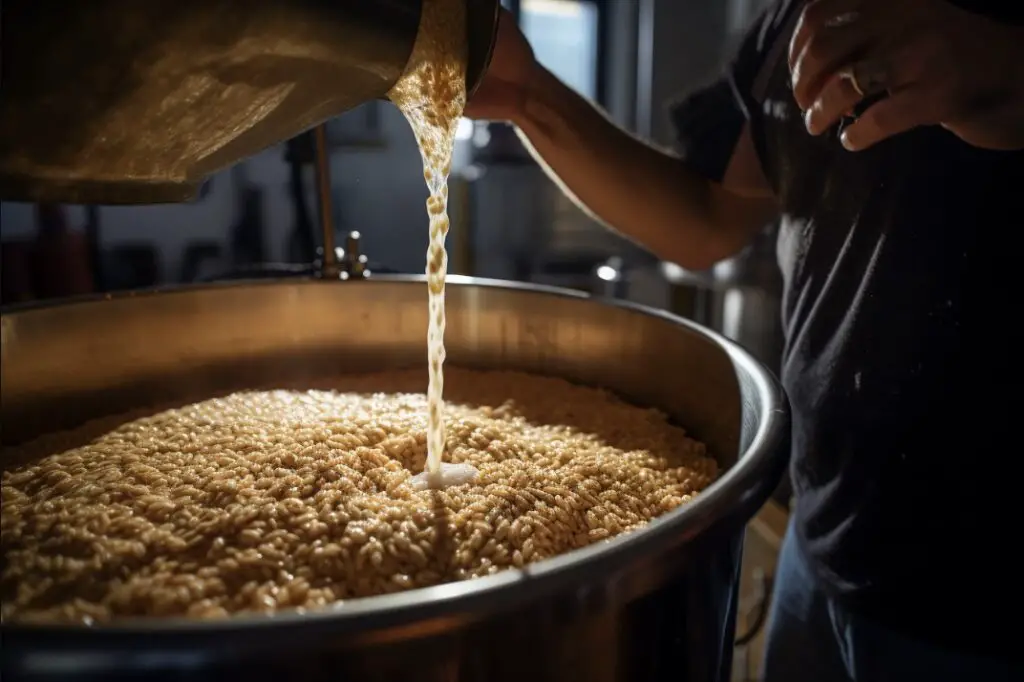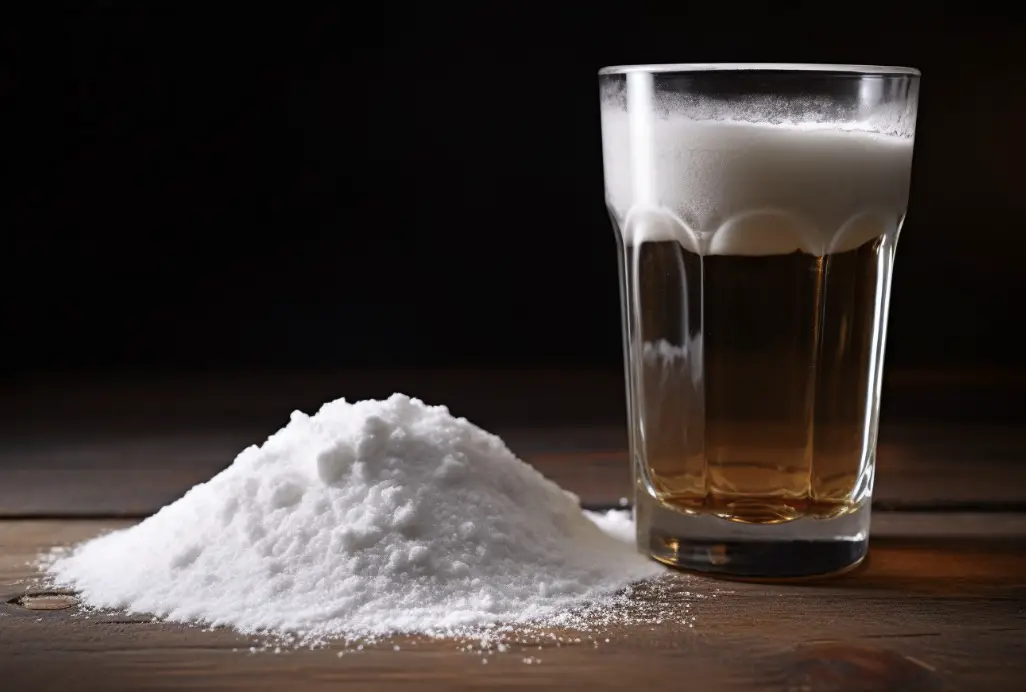In the world of brewing, there are many ingredients and processes that come into play to create the perfect pint. One such ingredient is gypsum, also known as calcium sulfate. But when should you add gypsum to beer?
The answer to this question lies in understanding the chemistry of brewing and the role that gypsum plays in it.
Gypsum is typically added before or during the mashing process to adjust the hardness of the water, lower the pH, and enhance the enzyme action.
Now, let’s dive deeper into the art and science of brewing, and understand the significance of gypsum in brewing.
What Is Gypsum and Why Is It Used In Brewing?
Gypsum is a naturally occurring mineral composed of calcium sulfate. It is most commonly known for its use in drywall, but it also has a significant role in brewing.
The primary purpose of adding gypsum in brewing is to modify the water mineral profile, add hardness, and adjust the pH level of the mash.
Water plays a crucial role in brewing, water constitutes about 90-95% of beer. The mineral content of water can greatly influence the taste of the beer.
Different styles of beer originated from different parts of the world, each with a unique water profile. For instance, the water in Dublin is rich in bicarbonates, making it perfect for brewing stouts. On the other hand, the water in Pilsen is soft and low in minerals, making it ideal for brewing pilsners.
By adding gypsum, brewers can mimic the water profile of different regions and brew a variety of beer styles.
When to Add Gypsum to the Mash
Gypsum is typically added during the mashing process. The mash is the first step in the brewing process, where malted grains are soaked in hot water to extract the sugars. The pH of the mash can greatly impact the efficiency of the enzymes that convert the starches into sugars.

The optimal pH for mashing is around 5.2-5.6. If the water is too alkaline, it can hinder the enzymatic activity and result in a less efficient conversion. Adding gypsum helps to lower the pH and create an ideal environment for the enzymes.
How Much Gypsum to Add?
The amount of gypsum to add can vary depending on the water profile and the style of beer you’re brewing. As a general rule of thumb, you can add about 1 teaspoon of gypsum per 5 gallons of water.
However, it’s always best to test the pH of your mash and adjust the amount of gypsum accordingly.
Here’s a simple table that indicates approximate gypsum (calcium sulfate) additions based on the general water hardness levels:
| General Hardness (GH) | Approx. Gypsum (CaSO₄) addition |
|---|---|
| 0-50 ppm (soft) | 100-200 mg/L |
| 51-100 ppm (moderate) | 50-100 mg/L |
| 101-150 ppm (hard) | 0-50 mg/L |
| >150 ppm (very hard) | Likely no addition needed |
Note on pH: Mash pH plays a vital role in enzymatic activity and overall beer flavor. Adding gypsum can help lower mash pH, but its effect is relatively mild.
If starting water is alkaline (high pH), even with hardness adjustments using gypsum, additional pH adjustments might be necessary using acid or acidulated malt.
Conversely, if the water is naturally acidic (low pH) and the grain bill contains a significant portion of dark malts (which also lower pH), brewers should be cautious not to lower pH too much by overusing gypsum. Always monitor the mash pH and adjust gypsum additions accordingly.
Always use this table as a starting point. It’s only really done accurately if you get a water analysis report to understand the full profile of your brewing water, including calcium, magnesium, sulfate, chloride, and bicarbonate levels. This report will provide more accurate information and will help in making more precise adjustments.
The Impact of Gypsum on Flavor
Apart from modifying the water profile and adjusting the pH, gypsum also contributes to the flavor of the beer. Gypsum can enhance the bitterness of the hops and add a dry finish to the beer, making it more crisp and refreshing.
This can be particularly beneficial for brewing hop-forward styles like IPAs. However, too much gypsum can lead to a harsh bitterness, so it’s important to use it in moderation.
Gypsum in All-Grain vs. Extract Brewing
Whether you’re brewing all-grain or extract, gypsum can be a useful tool for adjusting your water profile. However, its role can be more significant in all-grain brewing.
In all-grain brewing, you have full control over the mashing process, and the pH of the mash can greatly impact the efficiency of the conversion. In extract brewing, the malt extract has already undergone the mashing process, so the pH is less critical. However, you can still add gypsum to modify the water profile and enhance the hop character.
The Role of Gypsum in Homebrewing vs. Commercial Brewing
In homebrewing, adding gypsum can be a simple and effective way to adjust your water profile and enhance your beer. However, in commercial brewing, water treatment can be a more complex process, involving various chemicals and sophisticated equipment.
That said, gypsum remains a valuable tool in the brewer’s arsenal, regardless of the scale of brewing.
Risks of Adding Too Much Gypsum
While gypsum can be beneficial for brewing certain styles of beer, it’s important to use it judiciously. Overuse of gypsum can lead to an overly bitter beer and may even give it a harsh, astringent taste.
Overusing gypsum in beer making can have several adverse effects:
- Taste Imbalance: One of the primary reasons for adding gypsum is to emphasize hop bitterness in beer. However, if used excessively, the beer may end up tasting overly bitter or having a sharp, astringent quality that isn’t pleasant.
- Mineral Aftertaste: Overdosing with gypsum can lead to a pronounced mineral aftertaste, akin to the flavor of hard water.
- Unintended Mash pH Drop: While gypsum can help in lowering the pH of the mash, adding too much can drop the pH too low. An overly acidic mash can inhibit enzyme activity, potentially affecting the conversion of starches to sugars and leading to a lower extraction efficiency.
- Yeast Health: Excessive calcium (which is part of gypsum) can over-flocculate yeast, causing it to drop out of suspension prematurely. This can lead to incomplete fermentation, leaving a beer that’s overly sweet or has a higher final gravity than desired.
- Calcium Overload: Although calcium plays a vital role in the brewing process by aiding in enzyme function, yeast health, and protein coagulation, there is a limit. Too much calcium can lead to beer instability and other unwanted flavor changes.
- Sulfate-to-Chloride Ratio Imbalance: The balance between sulfate (from gypsum) and chloride affects the beer’s taste profile. A beer with a high sulfate-to-chloride ratio will emphasize hop bitterness, while a beer with a higher chloride-to-sulfate ratio will emphasize malt sweetness. Overusing gypsum can skew this balance too far in one direction, which might not be suitable for the style you’re aiming to brew.
- Beer Clarity Issues: Excessive minerals can impact the clarity of the final beer, leading to haziness or other visual defects.
- Interactions with Other Minerals: High levels of calcium from excessive gypsum can interact with other minerals in the mash, potentially leading to precipitation and other unexpected reactions that can affect the brewing process.
In brewing, as with many culinary endeavors, moderation and precision are key. Using gypsum judiciously, based on a clear understanding of your water’s mineral content and the desired beer profile, will yield the best results. If you’re unsure about the exact amount to use, start with a conservative amount, and adjust in future batches based on your observations and tasting notes.
Conclusion
In conclusion, gypsum plays a key role in brewing. It can modify the water profile, adjust the pH of the mash, enhance the enzymatic activity, and contribute to the flavor of the beer. Whether you’re a homebrewer or a commercial brewer, understanding when and how to use gypsum can help you brew better beer.
10 Key Facts About Gypsum in Brewing
1. Gypsum is a naturally occurring mineral composed of calcium sulfate.
2. The primary purpose of adding gypsum in brewing is to modify the water profile and adjust the pH level of the mash.
3. Gypsum is typically added during the mashing process.
4. The optimal pH for mashing is around 5.2-5.6.
5. Adding gypsum helps to lower the pH and create an ideal environment for the enzymes.
6. You can add about 1 teaspoon of gypsum per 5 gallons of water.
7. Gypsum can enhance the bitterness of the hops and add a dry finish to the beer.
8. Gypsum’s role can be more significant in all-grain brewing.
9. In extract brewing, the malt extract has already undergone the mashing process, so the pH is less critical.
10. Gypsum remains a valuable tool in the brewer’s arsenal, regardless of the scale of brewing.
As a brewer, I’ve always found the science behind brewing fascinating. Understanding the role of each ingredient and process, and how they interact with each other, is what makes brewing both an art and a science. In my experience, adding gypsum has certainly helped me brew better beer. However, like with everything in brewing, it’s all about balance and understanding when and how to use it.
FAQs
How much gypsum do I add to mash?
The amount of gypsum you add to your mash depends on your specific recipe and desired outcome. It is typically recommended to add about 1-2 grams of gypsum per gallon of water used in the mash. However, it’s important to note that gypsum should be used in moderation as it can affect the pH and flavor profile of your beer.
How much gypsum do I add to an IPA?
The amount of gypsum you add to an IPA can vary depending on your personal preference. However, a common recommendation is to add about 1-2 grams of gypsum per gallon of beer.
Why do you add gypsum to beer?
Gypsum is commonly added to beer to adjust the water chemistry. It helps to enhance the flavor, balance the pH levels, and improve the clarity of the final product.
What does gypsum do to beer?
Gypsum enhances the flavor and quality of beer by adjusting the water chemistry. It helps to balance the pH levels and improves the clarity and stability of the final product.
How do you use gypsum in beer?
Gypsum is commonly used in beer brewing to adjust the water chemistry. It helps to enhance the flavor and clarity of the beer. By adding gypsum to the brewing water, it can increase the hardness and calcium content, which is beneficial for certain beer styles like hop-forward beers. Overall, gypsum is used to balance the water profile and create a more suitable environment for brewing beer.
How much gypsum do I add to beer?
The amount of gypsum you add to beer depends on the specific recipe and desired characteristics. Generally, it is recommended to add about 1 to 2 grams of gypsum per gallon of beer during the brewing process. However, it’s important to note that the exact quantity may vary based on personal preference and the style of beer you are brewing.




-recipe.jpg)